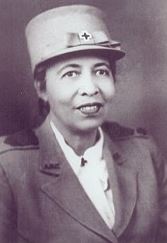Bess Bolden Walcott facts for kids
Bess Bolden Walcott (1886-1988) was an amazing American educator, librarian, and activist. She helped show how important Tuskegee University was to history.
Booker T. Washington asked her to come to Tuskegee. She helped him with his library and taught science. Bess stayed at the institute until 1962, but kept helping out into the 1970s.
During her 54 years at Tuskegee, she did many important things. She organized Washington's library and taught science and English. Bess also started and edited two big campus newspapers. She managed public relations for the school.
She also started the Red Cross chapter there. Bess took care of the George Washington Carver collection and museum. She even helped Tuskegee get listed on the National Register of Historic Places.
Besides her work at the school, Walcott was active in the women's right to vote movement. She was also a member of the Women's International League for Peace and Freedom. In the early 1960s, she became the national vice president of this group. In 2003, Alabama honored her by adding her to the Alabama Women's Hall of Fame.
Contents
Bess's Early Life and Education
Bessie Adeline Bolden was born on November 4, 1886. Her hometown was Xenia, Ohio. Her parents were Fannie A. and William P. Bolden.
Around 1900, her family moved to Painesville, Ohio. In June 1908, Bess graduated from Oberlin College. Soon after, she got a job at Tuskegee Institute.
Her Career at Tuskegee
Bess Bolden started her career teaching science at Tuskegee. She also helped Booker T. Washington organize his library. In 1911, she married William Holbrook Walcott. He was also a professor at Tuskegee.
In 1918, she began teaching English at the high school. That same year, she worked hard to start a Red Cross chapter at Tuskegee. This was the first Red Cross chapter for Black people in the United States.
Bess was the main person behind this new Red Cross chapter. Other important leaders were Robert Russa Moton and his wife Jennie. Booker T. Washington's wife, Margaret, also helped.
Jennie, Margaret, and Bess were part of the Tuskegee Woman's Club. This club worked for women's right to vote. When women finally got the right to vote, Bess and three friends quickly went to register.
Red Cross Work and Public Relations
Walcott's Red Cross work kept her very busy. She helped with the war effort during World War I. She also helped during the 1918 flu pandemic.
In 1931, Walcott moved to a new role. She managed the school’s press service. She also handled newspaper publicity. Bess started and edited two big campus publications: the Tuskegee Messenger and Service.
During the Great Depression, Bess led the Red Cross chapter. They gave food and goods to poor Black farm families. They got money from the national Red Cross to do this. In 1936, she led the 40th anniversary celebration for George Washington Carver. This honored his important work at Tuskegee.
World War II and Beyond
In 1941, during World War II, Walcott made history. She became the first African American to be an Acting Field Director for the Red Cross. From 1942 to 1946, she was Tuskegee's Public Relations Director.
Much of her work focused on sharing the story of the Tuskegee Airmen. To support the war, Walcott traveled a lot. She also sold war bonds.
In 1946, she became Acting Field Director again until 1947. Her job was to help soldiers returning from the war. She also helped train Red Cross volunteers. During this time, she joined the Women's International League for Peace and Freedom (WILPF). Other famous Black women leaders like Coretta Scott King also joined.
In 1947, Walcott and her husband divorced. They had four children together. She became the curator of The George Washington Carver Museum from 1951 to 1962. She retired from Tuskegee in 1962.
In 1962, Walcott was chosen as the national vice president of WILPF. She went to San Francisco as the American delegate for a big meeting. She also gave talks for WILPF about Civil Rights. For example, she spoke at a conference in Colorado in 1963. Her talk was called Next Steps Toward Integration, North and South.
International Work and Legacy
Between 1964 and 1965, Walcott traveled to Liberia. She worked as a consultant for a new cultural center there. William Tubman, the President of Liberia, honored her. He made her a knight of the Humane Order of African Redemption.
At Tuskegee, she carefully collected and saved art and historical items by Carver. This included his letters. Her efforts helped show Tuskegee's key role in state and national history. This led to Tuskegee Institute becoming a National Historic Landmark in 1965.
Walcott's work as a museum curator helped it become a National Park Service site. In the 1970s, she helped the Park Service restore Booker T. Washington's home, The Oaks.
Later Life and Honors
Bess Bolden Walcott passed away on April 18, 1988. She died in Tuskegee, Alabama. In 2003, she was honored for her important work. She was added to the Alabama Women's Hall of Fame.
 | Stephanie Wilson |
 | Charles Bolden |
 | Ronald McNair |
 | Frederick D. Gregory |


